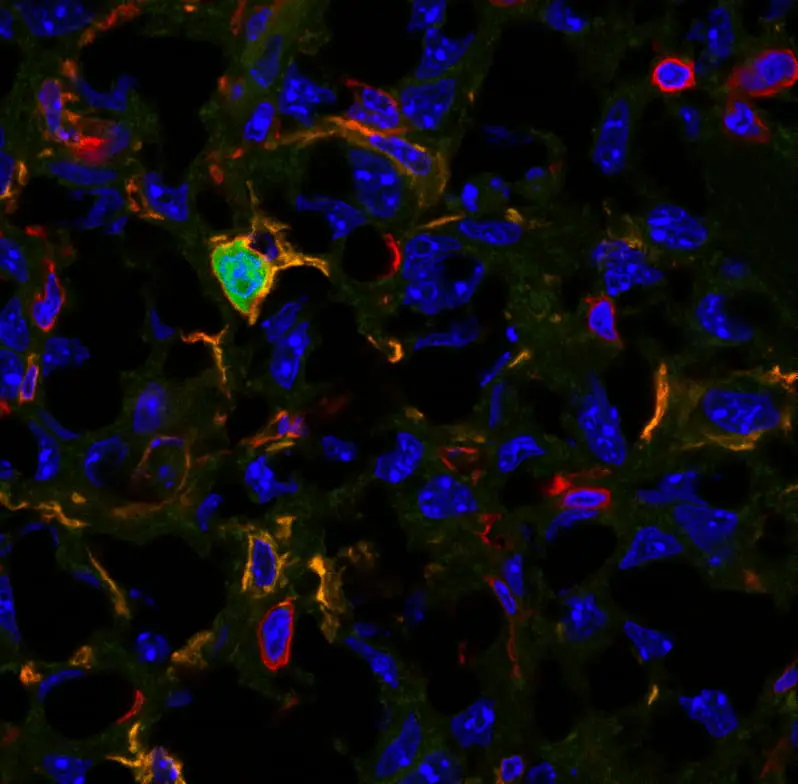“Erik’s project—focused on helping T cells fight cancer more effectively by using a special technique to remove proteins that make them “exhausted”—has opened the door to exploring new, more effective cancer treatments. Erik’s career has also taken off in significant ways. He has submitted his research findings publication in a high-impact journal, and his project led to significant funding from Curebound—all while he completes the final stretch of his doctorate.”
2023 Tullie and Rickey Families Spark Awards Winner
Erik Ehinger
What if we can hijack the immune system’s rubbish-disposal system to toughen T cells against cancer?
Funded: January 2023
Funded By: The generosity of LJI Board Director Dave Rickey and the Rickey Family
What was the goal of your SPARK project?
Immunotherapies such as checkpoint blockade and CAR T cell therapies can be effective for blood cancers, but these therapies struggle with solid tumors due to T cell “exhaustion,” where T cells lose responsiveness. T cell exhaustion is caused by inhibitory receptors like PD-1 and CTLA4. To address this challenge, I focused on the intrinsic molecular mechanisms underlying T cell exhaustion, rather than solely targeting peripheral inhibitory receptors. The goal of my SPARK project was to leverage the cellular degradation system to address the fundamental causes of immune cell exhaustion, aiming to develop the next generation of cancer therapies.
SPARK project results
In my studies, I found that NR4A transcription factors drive T cell exhaustion, hindering cancer immunotherapy. Using a proteolysis targeting chimera (PROTAC) called dTAG-13 to degrade NR4A proteins, I reduced exhaustion markers such as PD-1 and TIM3, restoring T cell function and boosting cytokine production. Animal models confirmed these findings, showing slower tumor growth and improved survival with systemic or T cell-specific NR4A depletion. These promising results suggest that PROTACs could offer a new avenue for enhancing cancer immunotherapy by directly targeting the mechanisms of T cell exhaustion. This novel approach may allow us to shift from targeting surface receptors to degrading exhaustion-promoting transcription factors, offering reversibility, potential oral administration, and a stronger anti-tumor response. I aim to further explore this strategy to enhance cancer treatment.
What’s next for this project?
My SPARK project started with the hypothesis that proteins overexpressed in tumor-infiltrating T cells cause exhaustion, impairing their tumor-fighting ability. Initially, I aimed to show these proteins induce exhaustion and that targeted degradation could mitigate this. Now, I’m investigating if these findings apply to human T cells and if degrading multiple exhaustion-related proteins enhances T cell tumor-fighting capacity. I’m also developing a therapeutic molecule to selectively target and degrade these proteins in human T cells. With this, I aim to bridge basic research and clinical applications, and advance this research from foundational science to therapy development.
What’s next for Erik?
As a SPARK grant recipient and current Ph.D. candidate, I anticipate completing my degree by the end of 2024. In January 2024, I received a Curebound Discovery Grant, building on my SPARK project. I also have a scientific manuscript under review, marking a key career milestone. This project has enriched my academic journey and broadened my professional perspective.

“Erik’s project—focused on helping T cells fight cancer more effectively by using a special technique to remove proteins that make them “exhausted”—has opened the door to exploring new, more effective cancer treatments. Erik’s career has also taken off in significant ways. He has submitted his research findings publication in a high-impact journal, and his project led to significant funding from Curebound—all while he completes the final stretch of his doctorate.”

